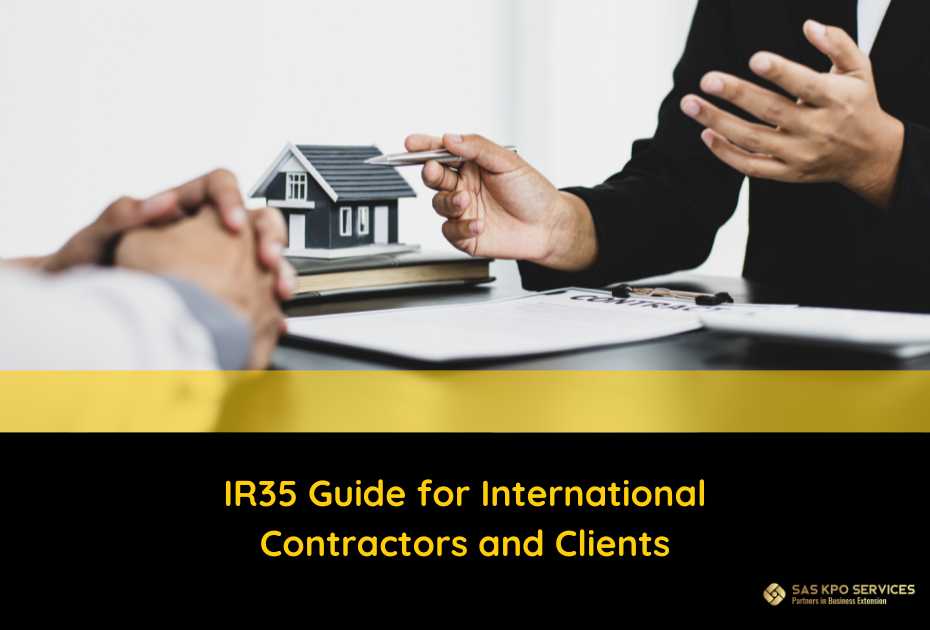
Many contractors and freelancers wonder if IR35 applies when working outside the UK or with foreign clients. The off-payroll (OPR) working rules set by HMRC can be confusing, and international contracts add another layer of complexity. That’s why we’re here at SAS KPO Services to help. In this IR35 guide for international contractors and clients, we break down the key facts so you can understand how these rules impact you.
IR35 applies to people who provide services through a middle, like a limited company (also called a “personal service company”) or a partnership. Before IR35, many contractors used limited companies to gain tax benefits—by receiving payments as dividends, which are taxed differently. However, some people misused this setup to avoid paying the correct taxes.
The purpose of IR35 is to prevent “disguised employment.” This means if you work like a regular employee but get paid through a mediator, HMRC wants to ensure you pay taxes like an employee. Understanding these rules is crucial, especially when dealing with international contracts. Stay informed, make smart business decisions, and ensure compliance with IR35.
Understanding IR35: Are You Inside or Outside the Rules?
IR35 is a tax rule that affects contractors in the UK. In the past, HMRC (the UK tax authority) was responsible for checking if contractors were avoiding taxes. But now, under IR35 guide for international contractors and clients, businesses that hire contractors must determine their IR35 status themselves. Small businesses don’t have to follow this rule, but medium and large companies must check if their contractors fall inside or outside IR35.
Outside IR35:
If a contractor is genuinely self-employed and paying taxes correctly, they are considered outside IR35. This means they can receive payments as a business, pay themselves a salary, and take the rest as dividends. Their client is responsible for checking and confirming this status, especially if they work with public sector companies or larger private businesses.
Inside IR35:
If a contractor is classified as inside IR35, they are taxed like a full-time employee. The company hiring them must deduct income tax and National Insurance before paying them. Contractors inside IR35 should make sure their taxes are handled correctly, and their work status is reviewed regularly to avoid mistakes. If HMRC finds that someone has been wrongly classified as outside IR35, they could face heavy fines.
Understanding your IR35 status is essential to stay compliant and avoid unexpected tax issues. If you’re a contractor or a company working with freelancers, make sure you follow the rules correctly.
IR35 Rules for Overseas Contractors
If you’re a UK contractor working abroad, IR35 still applies to you in some cases. Here’s how it works:
For UK Contractors Abroad:
If you’re working overseas for a UK-based company or if you are a UK tax resident, IR35 rules apply to you. It doesn’t matter where you’re physically working; your end client (the company you’re working for) is responsible for determining your IR35 status if they are a medium or large-sized company.
For Non-UK Contractors:
If you’re not a UK tax resident but you’re working in the UK, IR35 doesn’t apply to you, as long as you’re not paying UK tax. In this case, you would follow the tax rules in your own country.
Understanding how IR35 affects your status is important, no matter where you’re working from. If you’re unsure about your status, it’s always best to check with an expert to make sure you’re following the right rules.
IR35 Rules for Contractors Working with Overseas Clients
If you’re working with a company based outside the UK, you might wonder if IR35 applies to you. Here’s what you need to know:
Overseas Clients with UK Connections:
If your client has a UK office or branch, they are responsible for checking your IR35 status and handling any taxes or National Insurance payments. Even if they are based in another country, their UK presence means they must follow IR35 rules.
Clients with No UK Presence:
If your client has no UK office, the responsibility shifts to you as the contractor. You must determine if you fall inside or outside IR35 and handle your tax obligations accordingly.
Small Overseas Companies:
If your client is a small company based outside the UK, you are responsible for your IR35 status. The IR35 rules from before April 2021 still apply in these cases.
Payment in Foreign Currency:
The currency in which you’re paid doesn’t change your IR35 obligations. Whether you receive payment in GBP, dollars, or cryptocurrency, the same rules apply.
How to Stay Compliant
Before signing a contract with an overseas client, discuss IR35 with them. If they have a UK presence, they need to understand their responsibilities. If they don’t, it’s up to you to determine your IR35 status and provide proof if needed.
Understanding your IR35 position before taking an overseas contract can save you from unexpected tax issues later. Always keep clear records and seek expert advice when in doubt.
How is IR35 status determined?
IR35 rules help decide if a worker is truly self-employed or should be treated as an employee for tax purposes. Even though the responsibility for determining IR35 status has shifted, the key factors remain the same. These factors are based on long-standing case law about employment status.
To figure out IR35 status, it’s important to look at both the written contract and, more importantly, the way the worker actually operates in real life. Here are the main things to consider:
Control:
Does the client control what work is done and how, when, and where it’s completed? The more control they have, the more likely the worker is inside IR35.
Substitution:
Can the worker send someone else to do the job, or must they personally do the work? If only they can do it, they may be inside IR35.
Mutual Obligation:
Is the client required to give work, and is the worker required to accept it? If yes, it suggests employment.
Financial Risk:
Does the worker cover their own expenses, fix mistakes at their own cost, and take responsibility for their work? If so, they may be outside IR35.
Running a Business:
Does the worker have multiple clients, their own office, branding, insurance, or staff? If they do, they are more likely to be outside IR35.
Other things, like employee benefits, how integrated the worker is into the company, and whether they work exclusively for one client, also matter. These factors together create a full picture of IR35 status.
For those working across borders, IR35 guide for international contractors and clients can help clarify the rules and ensure compliance. Every contract is different, so it’s important to assess all details carefully.
How IR35 Affects Businesses and How SAS KPO Services Can Help?
IR35 rules have a big impact on businesses that hire contractors. These rules affect taxes, hiring costs, legal responsibilities, and overall business planning. Companies need to understand how IR35 works to stay compliant and manage costs effectively. Here’s a simple breakdown of how IR35 affects businesses and how SAS can help.
Financial Challenges
- Tax Responsibilities: Businesses must check if their contractors fall inside IR35. If they do, the company (or its agency) must deduct income tax and National Insurance just like they would for employees.
- Higher Costs: These extra tax payments and compliance requirements can increase business expenses. Many companies now need full-time staff just to handle IR35-related work.
- Budget Planning: Companies hiring contractors inside IR35 must plan for higher labor costs, which can affect financial strategies and long-term budgets.
More Paperwork and Admin Work
- Checking IR35 Status: Businesses must carefully assess each contractor’s status and keep proper records, including issuing Status Determination Statements (SDS).
- Payroll Adjustments: If a contractor is inside IR35, businesses must update their payroll system to ensure proper tax deductions.
Legal Risks and Compliance
- HMRC Investigations: Companies need to be prepared for HMRC audits. Mistakes in IR35 assessments can result in heavy fines and back payments.
- Handling Disputes: Contractors can challenge their IR35 status, so businesses must have a clear process to manage these disputes efficiently.
Hiring and Contracts
- Reviewing Contracts: Companies may need to change existing contracts to ensure they meet IR35 requirements. This helps in avoiding legal risks.
- Finding the Right Talent: The IR35 status of a role can affect whether contractors accept a job, making it harder for businesses to attract skilled workers.
How SAS Can Help
At SAS KPO Services, we understand how complicated IR35 can be, especially for companies working with international contractors. That’s why we offer expert support to help businesses manage their IR35 responsibilities. Our team ensures compliance, reduces administrative work, and helps businesses make cost-effective hiring decisions.
With our knowledge of tax laws and outsourcing solutions, we assist companies in understanding IR35, ensuring proper contract structuring, and handling payroll efficiently. Partner with SAS to stay compliant, reduce risks, and focus on growing your business without IR35 worries.
Shivani Soni (Digital Marketing Specialist, Top Marketing Voice) writes this blog

